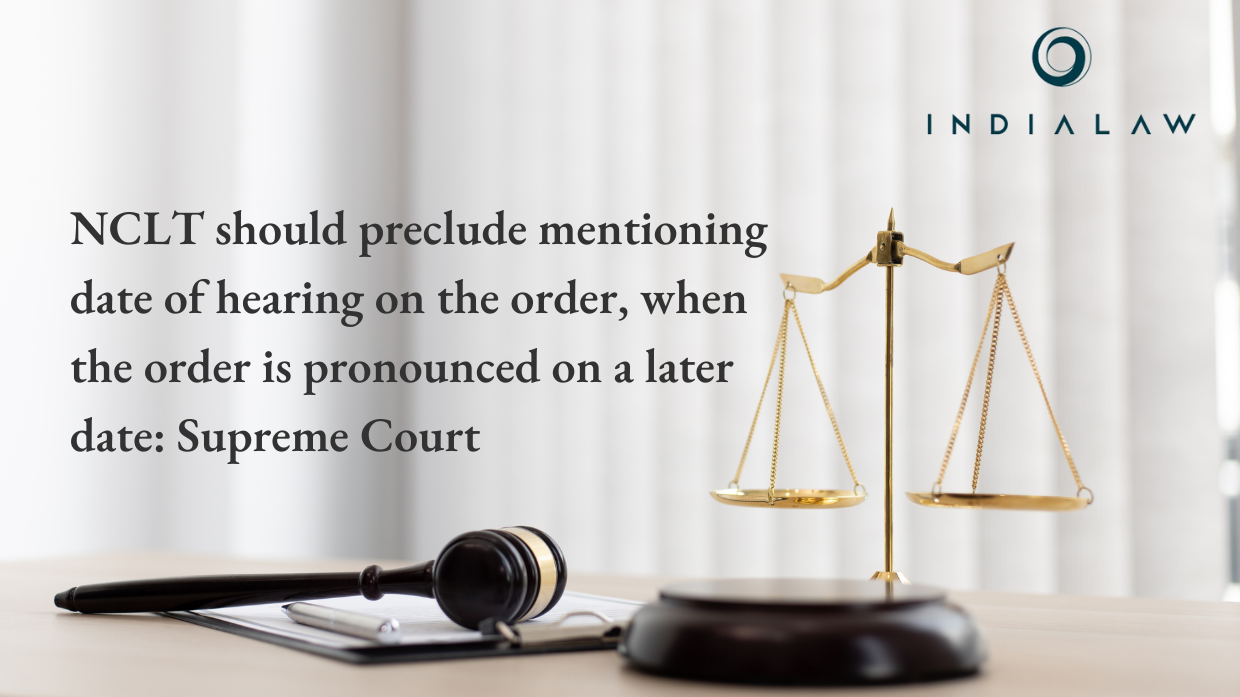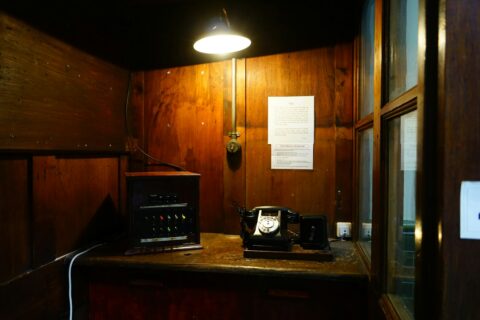NCLT should preclude mentioning date of hearing on the order, when the order is pronounced on a later date: Supreme Court

The Three Judge Bench of Hon’ble Supreme Court (SC) comprising of Chief Justice of India D.Y. Chandrachud, Justices J.B. Pardiwala and Manoj Mishra in Sanjay Pandurang Kalate v. Vistra ITCL (India) Limited and Others[i] clarifiedthat when the matter has been heard on a particular day but the order is pronounced on a later date, the National Company Law Tribunal (NCLT) must refrain from affixing the date of hearing on the order.
A former director of the Corporate Debtor filed an appeal before the Supreme Court challenging the order of the NCLAT wherein the NCLAT rejected an appeal as it was filed beyond the limitation period of 45 days as prescribed under Section 61(2) of the Insolvency and Bankruptcy Code, 2016 (IBC).
Facts in brief
The Financial Creditor, Vistra ITCL (Respondent No.1 in the instant appeal) filed an Application before the NCLT under Section 7 of the IBC for initiation of Corporate Insolvency Resolution Process (CIRP) against the Corporate Debtor, Evirant Developers Private Limited.
The Appellant, the former director of Corporate Debtor, had filed an Interlocutory Application before the NCLT alleging that the reply was filed by Respondent No. 2 without authorization of the Board of Directors or intimation to the Appellant.
The NCLT heard the Application on 17th May 2023, however the order of the NCLT was not pronounced and no substantive order was passed. The Registry uploaded the order on 30th May 2023; however, the order mentioned the date of 17th May 2023. The NCLT dismissed Section 7 application because it was filed without board authorization and with a frivolous intent to delay the proceedings.
Aggrieved by the same, the Appellant applied for the certified copy of the order on 30th May 2023, which was received on 1st June 2023. The Appeallant e-filed the appeal on 10th July 2023 before the NCLAT along with the Application for condonation of delay. The Appeallant contended that that the limitation would begin from 30th May 2023, when the order was uploaded on the website. Further, as the NCLAT was closed for summer vacations between 5th June 2023 to 2nd July 2023, this period should be excluded from the calculation of limitation.
The NCLAT while relying on the Judgement in the matter of Nagarajan V SKS Ispat [ii] rejected the Appellant’s contention that the time should run from date of upload and accordingly, the Appeal was dismissed as barred by limitation.
Issue before the Supreme Court
The issue before the Supreme Court was limited to the question of limitation under the IBC.
Analysis of the Supreme Court
The SC while referring to Judgement of V. Nagarajan (Supra), clarified that the limitation commences from the date of pronouncement and not the date of the upload of order or receipt of certified copy. The Court referred to Rule 89(1) of the NCLT Rules, 2016 and clarified that the Registry publishes its cause list, a distinction is drawn between cases listed for pronouncement of orders and other cases. Hence, the Rules specify that pronouncement of order is a mandate and the same cannot be dispensed with. It added that the Rules make a clear distinction between the ‘hearing’ and the ‘pronouncement’ of the order. Rule 150 (1) provides that after hearing the parties, the order may be pronounced either at once or soon thereafter.
The SC emphasized that the NCLT should refrain from mentioning the date of hearing on its orders when the same was pronounced and uploaded. The SC further observed, “To avoid situations such as these, in cases where the matter has been heard on a particular day but the order is pronounced on a later date, the NCLT must refrain from affixing the date of hearing on the order. Such an approach would be a violation of the NCLT Rules, which create a distinction between hearing and pronouncement and do not allow the NCLT to dispense with the requirement of pronouncement”.
The Court clarified that in the case of V Nagarajan Case (supra), there was a pronouncement of the order before it was uploaded on the website. Whereas in this case, the order would be considered pronounced by the NCLT on the same day it was uploaded on the website.
Findings of the Supreme Court
The SC concluded that the limitation began to run on 30th May 2023 and 30 days limitation period would conclude on 29th June 2023. It noted that although the Appeal was filed beyond 30 days’ timeline, it was filed within the condonable period of 15 days.
The bench clarified that “...Limitation would not begin to run on 17th May 2023 which was the date on which hearings concluded. As no order was passed before 30 May 2023, there was no occasion for the appellant to lodge an application for a certified copy on 17 May 2023. Time for filing an appeal would commence only when the order appealed from was uploaded since prior to that date no order was pronounced”.
Based on the above findings, the SC restored the Appeal before the NCLAT for reconsidering whether the Appellant has shown sufficient cause for condoning the delay beyond 30 days.
The SC clarified that the pronouncement of an order as per the NCLT Rules is a mandate and the same cannot be dispensed with. The judgment has brought clarity that an Appellant cannot suffer due to technical lacunas. The SC further emphasized that the NCLT should refrain from mentioning the date of hearing as the date of pronouncement of the order when the same is pronounced at a later date.
[i] 2023 SCC OnLine SC 1663
[ii] (2002) 2 SCC 244
By entering the email address you agree to our Privacy Policy.



